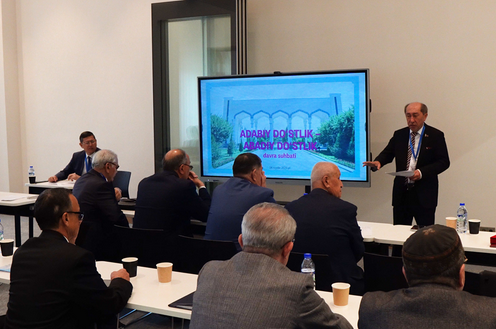On 14 November, the Center for Islamic Civilization of Uzbekistan (CIC) continued the work of the International Congress “Central Asia and Azerbaijan: Shared Spiritual and Educational Heritage — Shared Future,” hosting a series of major forums with participants from Uzbekistan, Kazakhstan, Kyrgyzstan, Tajikistan, Turkmenistan, and Azerbaijan. Over the course of the day, more than 200 experts and scholars delivered papers on preserving historical heritage, the role of the arts, and intercultural exchange in the region.
The program of the Second Forum of Central Asian Historians — “Historical and Cultural Heritage of Central Asia: A Common Past, a Shared Future” — proved especially rich.
Speakers included: Shavkat Ayupov, president of the Academy of Sciences of Uzbekistan; Isa Habibbayli, president of the National Academy of Sciences of Azerbaijan; Kanatbek Abdrakhmatov, president of the National Academy of Sciences of Kyrgyzstan; Mukhammaddavud Salomiyyon, vice president of the National Academy of Sciences of Tajikistan; Telen Zhenisbek, head of the Center for the Sciences of Education and Public Development of the National Academy of Sciences of Kazakhstan under the President; and Mukhammad Mamedov, head of the National Directorate for the Protection, Study, and Restoration of Historical and Cultural Monuments of the Ministry of Culture of Turkmenistan.
After the plenary session, discussions continued across two thematic panels: “Material Culture and Spiritual Heritage of Central Asia” and “The History of Central Asia: From the Past to the Present.”
A parallel forum, “Preserving and Protecting Islamic Values,” brought together theologians and scholars of religion to address the modern challenges facing traditional Islam, the importance of scholarly and theological schools in the region, and the role of religious institutions in strengthening the spiritual environment.
A professional forum for librarians also took place: “From Ancient Manuscripts to Digital Archives: The Development of Library Science in Central Asia,” which focused on digitizing collections, creating modern archival platforms, and expanding cooperation among national libraries in the region.
Events related to cinema were also held. As part of the forum “Documentary Film, Cinema, and Cultural Values Through the Eyes of Central Asia,” audiences attended screenings of feature and documentary films from across the region, along with thematic discussions and meetings with filmmakers.
Special attention was given to visual art. At the forum of artists from Central Asia and Azerbaijan, “A Great History — A Great Future,” participants explored shared artistic traditions, the portrayal of historical figures in painting, and the potential for collaborative projects among creative unions.
Contemporary challenges in education were discussed during the session “Youth and the Digital Age: From Ancient Manuscripts to Artificial Intelligence,” where experts examined the impact of AI on culture, the preservation of digital memory, media literacy, and issues of digital inequality.
A literary roundtable titled “Literary Friendship Is Eternal Friendship,” organized by the Writers’ Union, addressed the development of literary translation, cooperation among creative associations, and the preservation of historical memory in contemporary literature.
A media forum, “Cultural and Educational Television Channels: New Formats and International Media Cooperation,” gathered regional TV and radio organizations to exchange experience in producing educational content and to discuss new genre approaches in cultural programming.
The day concluded at the Palace of Cinema with a screening of the film Amir Temur and Donna Maria.
On the final day of the Congress, 15 November, the International Kelajak Merosi Award Ceremony will take place with the participation of President Shavkat Mirziyoyev and the leaders of Central Asian states and Azerbaijan. A signing ceremony for memorandums and the adoption of the Central Asia Declaration will also be held.
ℹ️ The International Congress “Central Asia and Azerbaijan: Shared Spiritual and Educational Heritage — Shared Future” is held from 13 to 15 November at the initiative of President Shavkat Mirziyoyev. It is organized by the CIC in cooperation with the Ministry of Foreign Affairs, the Academy of Sciences of Uzbekistan, the International Institute of Central Asia, and the World Society for the Study, Preservation, and Promotion of the Cultural Heritage of Uzbekistan (WOSCU).
ℹ️ The Center for Islamic Civilization (CIC) in Uzbekistan was built in Tashkent next to the Khast-Imam complex. The building, designed in the style of medieval architectural monuments, features four portals, each 34 meters high, and a 65-meter central dome. It houses the Hall of the Quran, a 460-seat conference hall, and a museum whose exhibitions cover the history of Uzbekistan from pre-Islamic times to the present. The CIC is intended to serve as a platform for studying the heritage of past generations and its contemporary interpretation, in cooperation with the International Islamic Academy of Uzbekistan and scholarly and educational centers worldwide.










